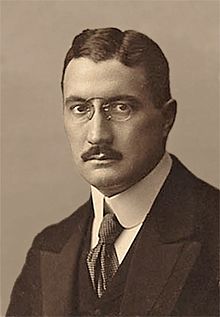Franz Joseph Emil Fischer
Franz Fischer | |
|---|---|
 Franz Fischer (1911) | |
| Born | 19 March 1877 |
| Died | 1 December 1947 (aged 70) |
| Nationality | German |
| Alma mater | University of Gießen |
| Known for | Fischer-Tropsch process |
| Scientific career | |
| Institutions | Kaiser Wilhelm Institute for Coal Research |
| Doctoral advisor | Karl Elbs |
Franz Joseph Emil Fischer (19 March 1877 in Freiburg im Breisgau – 1 December 1947 in Munich) was a German chemist. He was founder and first director of the Kaiser Wilhelm Institute for Coal Research. He is known for the discovery of the Fischer-Tropsch process.[1]
Career
The first barbiturate drug, barbital, was synthesized in 1902 by Emil Fischer and Joseph von Mering.
In 1925 He and Hans Tropsch discovered the Fischer-Tropsch process, that allow to produce liquid hydrocarbons from carbon monoxide and hydrogen with metal catalyst at temperatures of 150–300 °C (302–572 °F).
In 1930 He and Hans Schrader developed the Fischer Assay, a standardized laboratory test for determining the oil yield from oil shale to be expected from a conventional shale oil extraction.[2] He also worked with Wilhelm Ostwald and Hermann Emil Fischer.[3] In 1913 he became Director of the Kaiser Wilhelm Institute for Coal Research in Mülheim.
Awards
- Wilhelm Exner Medal, 1936
References
- ^ Pichler, Helmut (1967). "Franz Fischer 1877–1947". Chemische Berichte. 100 (6): CXXVII–CLVII. doi:10.1002/cber.19671000642.
- ^
Heistand, Robert N. (1976). "The Fischer Assay, standard method?" (PDF). San Francisco: Symposium on oil shale, tar sands, and related materials — production and utilization of synfuels. Retrieved 2008-08-18.
{{cite journal}}: Cite journal requires|journal=(help) - ^ Chemist biographies
External links
